Candidate For Navajo Nation Presidency Under Fire For Not Speaking Navajo Well Enough
Politics, the law, culture, and a very old language collide.
A candidate for the Presidency of the Navajo Nation is facing a problem due to the fact that he isn’t very fluent in Navajo:
TUBA CITY, Ariz. — In his run for president of the Navajo Nation, Chris Deschene has presented voters with impressive credentials: A veteran of the Marine Corps, he is a lawyer, a trained engineer and a former member of the Arizona House of Representatives, where he represented part of the tribe’s reservation.
But there is a problem that may disqualify him as a candidate: His command of the Navajo language is far from perfect, as he himself admits. And Navajo law requires the tribe’s president to speak the language fluently.
Thus Mr. Deschene’s candidacy has exposed a deep divide within the Navajo Nation, the country’s largest Indian tribe, about the role that language should play in modern Navajo society, the tribe’s direction in the new millennium and how traditionally Navajo the tribe’s leader needs to be.
As in so many Indian tribes, fewer and fewer young people understand the language. And for many tribal elders, the prospect of a president who does not speak fluent Navajo has stoked fears that the language could recede or even die, taking many of the tribe’s traditions with it.
“We are at a crossroads,” said Peterson Zah, 78, a former president of the Navajo Nation. He spoke proudly of the role the Navajo language played in World War II, when it was used as an unbreakable code that helped the United States defeat Japan. “Our nation is renowned for our language around the world,” he said. “If English becomes the dominant language, then what are we doing to ourselves?”
Election officials will now decide if Mr. Deschene, 43, who finished second in the primary election last month, is fluent enough to remain on the ballot in November. On Friday, the Navajo Supreme Court held a hearing in which it declined to rule on his candidacy, but did reaffirm the requirement that the president speak Navajo.
Mr. Deschene has pledged his commitment to maintaining the language, which is now taught in many schools around the reservation. He understands enough of the language to communicate, he said, and promises to become fully fluent by the end of his first term, if elected.
More important than his language proficiency, Mr. Deschene said, is how he can help the tribe with the continuing economic crisis it confronts. Unemployment on the Navajo reservation, which includes parts of Arizona, New Mexico and Utah, is nearly 50 percent. Many people, particularly on the western side near where Mr. Deschene grew up, lack basic utilities like electricity and running water. Roads are unpaved. And the lack of jobs and housing continues to force young people to leave the reservation to look for work elsewhere.
“The conditions in the Navajo Nation are akin to a third world country,” Mr. Deschene said. In an interview, he repeatedly stressed the importance of preserving language and culture, but added, “Our job as leaders is to provide for the basic needs of our people. Every member of the nation deserves basic amenities like water, power and roads.”
If Mr. Deschene stays on the ballot, he will face Joe Shirley Jr., a former Navajo Nation president. Mr. Shirley, 66, said that preserving the tribe’s traditions would be his top priority if he were elected again.
“Preservation of our way of life and our culture is foremost, and fundamental to us,” Mr. Shirley said. “Five hundred years down the road, I want people to be speaking the language, and have our way of life.”
On the red mesas at the western edge of the reservation, Jack Begay, 56, bemoaned the shrinking population of Navajo speakers like himself.
“A lot of our young, they don’t really care to talk Navajo,” said Mr. Begay, a rancher who herds cattle, horses and sheep. “We’re forgetting more and more our culture.”
Even so, he said, he supports Mr. Deschene, saying that past presidents had done little for the western part of the Navajo Nation. “He’s new, and he’s been in the military — that will help,” Mr. Begay said. “We teach our kids to go out and get an education, and maybe one day come back and lead the Navajo people. That’s what Chris did. He went to college, and now he’s back to the Navajo people.”
In many respect’s the position that Deschene finds himself in appears to be similar to one that of many younger Navajo. While older generations and tribal elders continue to believe that it is important to their culture that the tribe’s language remain alive, many younger people don’t seem to feel the same way. The fact that these younger generations haven’t been taught the language as they may have been in the past. Given the fact that they are growing up in a society where English is the predominant language, and where it indeed seems to be the primary language that even people who are fluent in Navajo speak on a regular basis use in daily conversation. Given that, it isn’t entirely surprising that fluency among younger generations — and Deschene is one of those younger generations at the age of only 43 — has declined over the years.
That decline in fluency, obviously leads to the question of just how important it is that the President of the Navajo Nation be fluent in Navajo and what fluency even means in this context. Deschene says that he’s fluent enough in the language to be able to carry on conversations with fellow Navajo, and there’s nothing in the linked article that suggest otherwise, so the question that the Court, and more broadly, Navajo society in general. Not being at all versed in the applicable law here, I’m not going to hazard a guess at what the Navajo Supreme Court might do here, although it obviously will depend on what the meaning of “fluency” is in this context. However, it seems clear that this is really just a reflection of broader changes in a Navajo society that may be integrating into American culture far more than tribal elders would like.
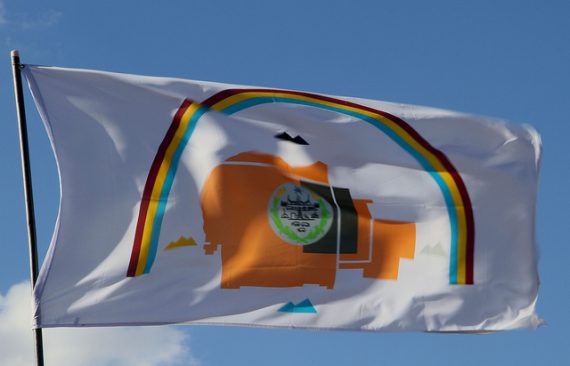

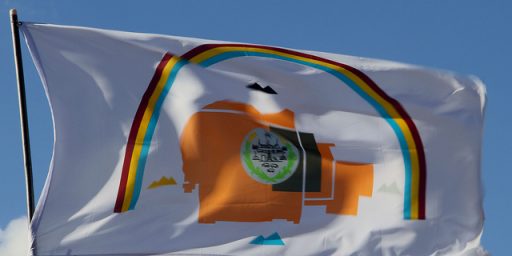

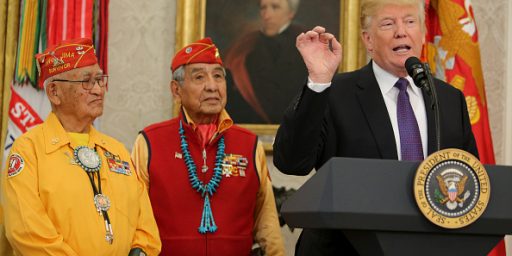
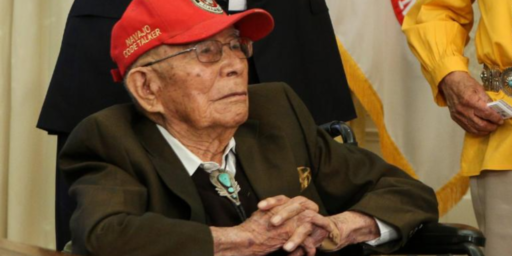
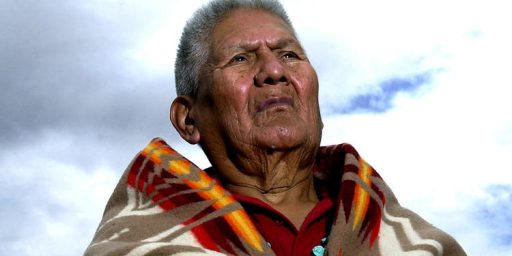
Perhaps Senator Elizabeth Warren can offer to tutor him…
I’m not going to hazard a guess at what the Navajo Supreme Court might do here…
How do you say “Bush v. Gore” in Navajo?
Hell… Obummer aint even a Murican, and that aint got him stopped from being presdent.
And what those Indians want anyway with a presdent. We beat em fair & square.
George W. Bush likely benefited from the US not requiring fluency in English for our presidents.
@Gustopher: George W. Bush likely benefited from the US not requiring fluency in English for our presidents.
I think it’s fair to say that about both Bushes. George W. Bush was once described as if English was his second language, but he didn’t have a first one. And George H. W. Bush… I think the quote goes “he wrestles with a sentence, going round and round, until he exhaustedly reaches the end and they call it a draw at the period.”
But both men acknowledged their occasional fumble-mouthedness with grace and good humor.
So I guess Chris Deschene being a Redskins fan is just right out.
Not being Navajo, and not even living in the 4 Corners, much less knowing any Navajos, or anything about any of the issues they might deal with, I**** for one would not venture to say what this reflects or even express any kind of an opinion about it at all. Not that any of that ever stopped Doug from looking thru muddy waters and saying whatever might pop into his head about anything.
**** My little sis once taught on the Res, might that count?
Holy fart, I liked two Jenos comments in the same thread.
@Franklin: You fool! You’re not supposed to ADMIT that!
(But thank you!)
I don’t think it’s an integration issue so much as it’s a tradition issue. I think it’s also a generational issue. At some point between the Codetalker generation and the AIM generation, the Navajo language became a school subject instead of something used to communicate with babies.
Clearly, there is a Second Amendment solution for this, right?
@al-Ameda:
First, we shoot all the lawyers.